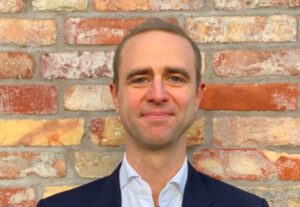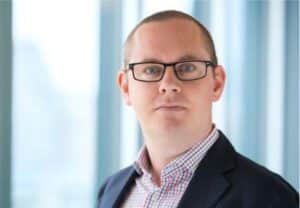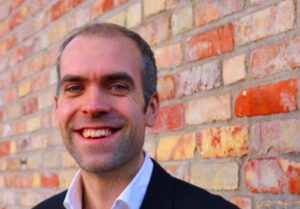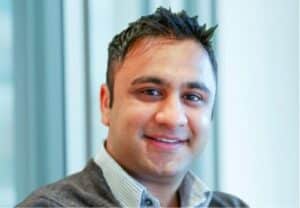Stockholm (HedgeNordic) – Man Group, headquartered in London, with assets of USD 108.3 billion and over 1,400 staff, is one of the world’s largest alternative asset managers spanning quantitative and discretionary strategies. OQAM, an emerging “quantamental” manager, which runs SEK 165 million from Malmo in the South of Sweden, across the Oresund bridge from Copenhagen, is one of the smallest. Yet there are many similarities in how the two companies made use of technology before, during and after the Covid crisis.
Flexible Working, Remote Working and Collaboration

Says Andreas Olsson, OQAM co-founder, CEO and Senior Portfolio Manager: “Microsoft 365 suite (including Teams), Zoom, Slack, remote access via VPN and Git are examples of technology tools that facilitate remote working. During the Covid crisis in 2020, even though Sweden never implemented a lockdown, OQAM chose to do everything except for front office trading by working from home. A maximum of two of the team of four full time employees and four part time student employees were in the office at any time. One service provider who stood out as being pro-active was Bloomberg. They made sure we had everything we needed from an infrastructure perspective if we had been suddenly forced to carry out all front office functions, including trade execution, remotely. We are an emerging manager and it was great to feel the support of a company like Bloomberg with their resources. All mid office, back office, IR and R&D-functions could already be carried out remotely. OQAM also benefits from the technology capabilities of FCG Fonder, a Swedish “fund hotel” platform, which provides the AIFM. Investor due diligence into OQAM went remote for a while, but physical meetings have now resumed”.
“During the Covid crisis in 2020, even though Sweden never implemented a lockdown, OQAM chose to do everything except for front office trading by working from home.”

Says Tom Price, CTO of Core Technology at Man Group: “Over the last two years, Man Group has been investing in our End User Technology platforms including remote access for desktop PCs, and laptops running a VPN to connect to our data centres; mobile devices; telephone and video conferencing in meeting rooms and all of the infrastructure that sits behind it. This investment was targeted at improving our support for flexible working in order to be able to attract and retain a diverse workforce, introducing new collaboration tools so we can work efficiently as a global team and ensuring the highest level of support and reliability for our staff”.
“Over the last two years, Man Group has been investing in our End User Technology platforms including remote access for desktop PCs, and laptops running a VPN to connect to our data centres; mobile devices; telephone and video conferencing in meeting rooms and all of the infrastructure that sits behind it.”
“In the weeks before lockdown we brought forward the release of several collaboration tools that our teams had been preparing – most notably Slack and WebEx. Both have played a significant role in allowing teams to continue to work productively from home; but they’ve also allowed our staff to stay in contact in more informal ways. Persistent chat tools like Slack are more casual than email and we’ve seen the creation of many channels that allow people to talk about things other than work. We’ve had hundreds of staff on WebEx calls for results updates from the CEO but also for charity quizzes and other social events. We also expanded the rollout of our electronic signature platform in March as a direct response to the COVID-19 lockdown. It’s played a key role in allowing us to maintain business as usual from home. Document sharing and collaborative creation are our current focus”.
“The speed of adoption of Slack and WebEx was unprecedented with almost 90% of staff using them within 2 weeks! Our plans are to continue to invest in collaboration and mobile tools. While we’re all stuck at home, we’ve really just swapped one fixed desk for another but, as things return to normal we’re excited about the increased capabilities we can offer mobile users whether they’re working at home, the office, or visiting clients and partners”.
“At Man Group we were already seeing a growing number of staff adopting flexible working, though adoption varied significantly across different business units.”
“At Man Group we were already seeing a growing number of staff adopting flexible working, though adoption varied significantly across different business units. Some teams would see all staff working from home at least one day a week, while others still came into the office every day. As lockdown starts to ease, we do expect more staff to want to work regularly from home, many of them for more than one day a week. People have worked out how to be as productive, if not more productive, when working from home; managers have learnt how to adapt their management style for a remote workforce. I’m cautious about over-reacting, and certainly not predicting the demise of the office, but things will definitely be different, and we need to ensure technology systems support that change.”
“We would not want staff to be at home permanently, because we still think it is useful to meet in the office as a team to drive forward innovation.”
Olsson agrees that the office will live on: “we would not want staff to be at home permanently, because we still think it is useful to meet in the office as a team to drive forward innovation”.
Automation
OQAM embraced technology from the very start of the business, for instance automating middle office routines to reduce timeframes from two hours to ten minutes. Olsson, who started his first hedge fund while at Sweden’s Lund university, has first-hand experience of all processes and says: “OQAM has always automated as much as possible, and Covid has not increased the need for automation. For example, service providers have been executing fund subscriptions and redemptions entirely electronically from the start”.
“OQAM has always automated as much as possible, and Covid has not increased the need for automation.”
Automation has not yet reached 100%. For instance: “OQAM only trades electronic markets, and trade execution could be completely automated, though we’ve chosen to have some manual element at this stage. Some regulatory reporting is also not yet fully automated but may be in future. For instance, our Capital Reserve Requirement (CRR) reporting is not yet fully automated”.
“At Man Group we have a team dedicated to the adoption of RPA (Robotic Process Automation) across the business. The move to remote working has encouraged our teams to look at processes and controls in different ways and automation provides new solutions.”
Automation is also a growing trend at Man Group. Says Price: “At Man Group we have a team dedicated to the adoption of RPA (Robotic Process Automation) across the business. The move to remote working has encouraged our teams to look at processes and controls in different ways and automation provides new solutions. The equipment and working conditions at home may be less conducive for certain manual tasks – for instance copying and pasting large amounts of data or comparing huge spreadsheets side-by-side can be hard on a laptop screen. With many Technology teams busy working on COVID-19 requirements RPA can provide tactical solutions to bridge the gap.”
The Role of the Cloud
The spectacular share price performance of cloud services companies in 2020 is based on impressive growth, but the cloud is far from exclusive.

OQAM uses Digital Ocean for cloud computing. It also hosts its databases of alternative data there. CTO, Martin Andersson says, “Digital Ocean was chosen since it’s a scalable solution as we grow, its attractive for developers (excellent documentation and communities, good set of APIs) and has a set of features/products we were looking for. Predictable and attractive pricing compared to other vendors was also a factor.”
Yet not all of OQAM’s needs are met by cloud applications. One example of this is the dynamic allocation among its suite of 20 investment models, where it uses machine learning to identify different market regimes: “we use a python based proprietary research platform that utilizes popular open source libraries such as pandas, scikit-learn and TensorFlow”, says CIO Thorbjörn Wallentin.
And while Man Group’s cloud usage is growing, it continues to use physical data centres for some purposes. Says Price: “Our Cloud strategy is to focus our internal capabilities on the high-performance research and investment systems that can differentiate us from other asset managers, while using Cloud to source and deliver commodity services. The data that we believe differentiates Man Group – the wide range of research data available to our quant analysts and the rich trading and ops data that drives the business – is still held in our data centres. What has moved to the Cloud is an increasing amount of our archive and backup data – systems where speed is less important, but volumes are considerable. Similarly, as we adopt newer collaboration tools, we favor cloud-based SaaS products so more of our “new” data is initially being created in the Cloud.”
Alternative Data

Some of OQAM’s models exploit computing power to store large amounts of alternative data and Man Group is also using alternative data. Says Hinesh Kalian, Director of Data Science at Man Group: “It’s important to take a step back and understand why alternative data is useful in the investment process. To put simply, it can provide an information edge over traditional data sources. During the pandemic, we feel it has provided us with a better read on the economy amid widespread global closures and re- openings. It has although become more prevalent that real-time indications of activity, as opposed to the typical reports that usually lag by at least a month is proving to be useful. In the coronavirus era, when the drop-in activity happened so rapidly, the need for more immediate indicators has increased. It’s not just been beneficial in investment management though. You are seeing government agencies and corporates increasingly exploring alternative data sources to obtain timely insights around Covid-19 and its social and economic impact.”
“It’s important to take a step back and understand why alternative data is useful in the investment process. To put simply, it can provide an information edge over traditional data sources.”
“We are not focusing on one particular source but are interested in the collective pieces that make up the puzzle. Having a specialised data science function at Man Group, coupled with a nimble and efficient data platform results in the ability to connect these pieces quickly, to provide early insights into changes in the economic health.”
This article featured in HedgeNordic’s report “Technology and Hedge Funds.”
